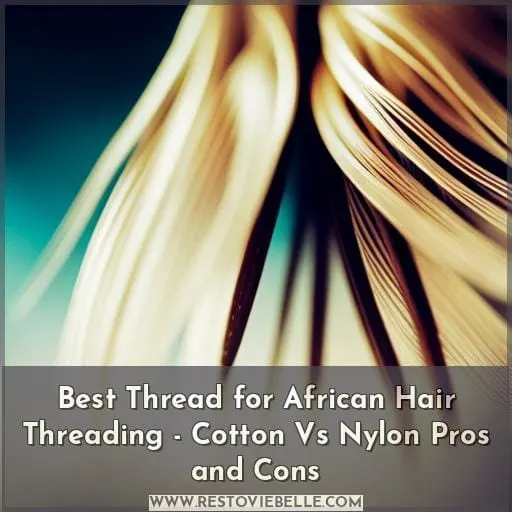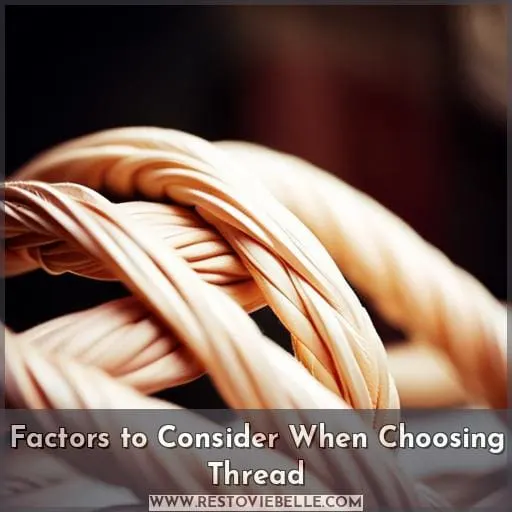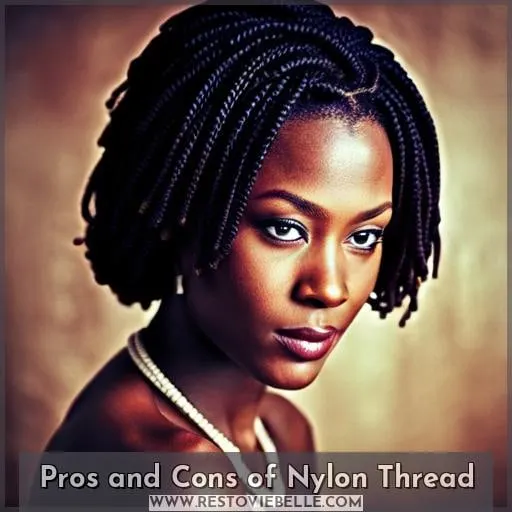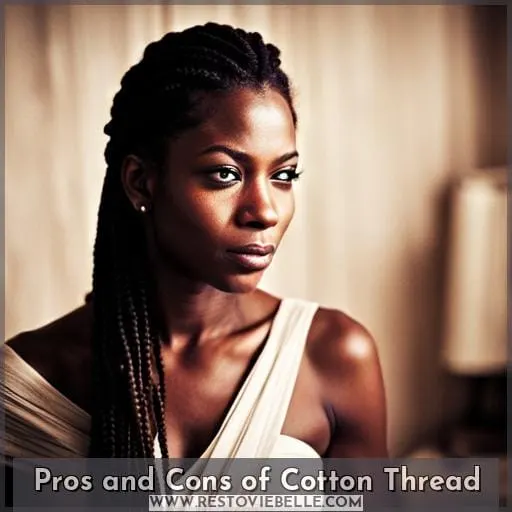This site is supported by our readers. We may earn a commission, at no cost to you, if you purchase through links.
 As the sandstorm swirls, threading your hair with cotton feels like a gentle breeze while nylon seems sharp as a needle.
As the sandstorm swirls, threading your hair with cotton feels like a gentle breeze while nylon seems sharp as a needle.
When deciding between cotton or nylon for African hair threading, consider your hair’s needs.
Cotton threads moisture while nylon resists snarls.
Though nylon lasts longer, cotton is gentler and less likely to snag.
Weigh the pros and cons to find your best threading thread and unlock hair health.
Table Of Contents
- Key Takeaways
- Factors to Consider When Choosing Thread
- Pros and Cons of Nylon Thread
- Pros and Cons of Cotton Thread
- Frequently Asked Questions (FAQs)
- What’s the best thread count/thickness to use for African hair threading?
- How do I prevent tangling and knots when using thread on African hair?
- Is it alright to reuse thread when re-doing an African threaded style?
- What’s the average cost of thread for African hair threading per style?
- Can I use embroidery thread or any decorative thread for African hair threading?
- Conclusion
Key Takeaways
- Consider hair type and desired styling outcome when choosing thread
- Nylon thread provides shine and lasts long, but doesn’t absorb moisture well
- Cotton thread is gentle and absorbs moisture, but may not last as long
- Check for allergies or sensitivities when selecting thread
Factors to Consider When Choosing Thread
Examine your hair type and texture, as some threads work better with coarser or finer strands.
Determine your desired outcome and styling options, since thread types impact sheen and hold.
Finally, consider any allergies or sensitivities, as natural fibers like cotton tend to be gentler than synthetic nylon.
Hair Type and Texture
When picking threading material for your hair, you’ll want to think about:
- Curl pattern
- Strand thickness
- Maintenance needs
- Cultural connections
- Purpose for threading
Analyze factors like:
- Hair density – thin or thick strands?
- Tightness of curls – loose waves or kinky coils?
- Porosity – does your hair absorb or repel moisture easily?
Understanding your hair will guide you in choosing threads for stretching, styling, and protective benefits.
Desired Outcome and Styling Options
Your chosen hairstyle and envisioned look should guide your thread pick.
For instance, those aiming for minimal length retention may prefer cotton for its moisture-absorption, while thick or shiny nylon threads lend themselves to intricate styles requiring sturdiness.
Consider cultural connections too – certain threads may honor heritage.
Overall, select thread supporting your styling creativity, desired length, and hair health.
Allergies or Sensitivities
Consider any allergies or sensitivities you have when choosing thread for African hair threading.
Some people may experience irritation or reactions from certain thread materials.
When threading hair, be aware of any sensitivities to materials like nylon or cotton.
Opt for hypoallergenic, gentle options if prone to allergic reactions.
Test a small section first to check for any irritation before threading the full head.
Prioritize your health and hair’s wellbeing by selecting threading materials compatible with your sensitivities.
Pros and Cons of Nylon Thread
When selecting nylon thread for African hair threading, consider the pros and cons:
- Nylon offers a shiny finish and is long-lasting, easy to remove, and resistant to tangling.
- However, nylon absorbs less moisture and may snag hair more than other options.
Advantages: Shiny Finish, Long-lasting, Easy to Remove
You’ll love how nylon thread gives your hair a shiny, polished finish that lasts long and removes easily when taking down styles.
The smooth texture of nylon glides effortlessly through strands, allowing for faster installation compared to cotton.
When ready to change a look, nylon threads unwind without excessive tugging or breakage.
The glossy sheen nylon imparts accentuates neatly threaded parts or patterns.
Disadvantages: Less Moisture Absorption, Potential for Snagging
An absence of moisture absorption along with possible snagging presents drawbacks when using nylon thread for African hair threading.
Nylon threads are quick and easy to remove, protect hair, and allow intricate styling.
- Their slickness and shine help detangle the hair, while
- adding to the finished appearance.
- However, nylon doesn’t grasp water as well as other threads, sometimes styling dry, brittle locks.
Pros and Cons of Cotton Thread
Pros of using cotton thread for African hair threading:
- Gentle on hair
- Absorbs moisture well
Cons of using cotton thread for African hair threading:
- May not last as long as other threads
- Has less sheen
Advantages: Gentle on Hair, Absorbs Moisture, Less Likely to Snag
Unlike nylon, cotton thread is gentler on your hair.
It absorbs moisture and is less prone to snagging.
Its soft texture glides smoothly over strands, reducing friction and breakage.
Cotton’s superior moisture absorption can benefit dry hair types, but frequent re-moisturizing may be needed.
With proper technique, cotton threading allows protective styling that celebrates your culture.
Disadvantages: May Not Last as Long, Less Sheen
May Not Last as Long, Less Sheen (Pros and Cons of Cotton Thread):
Some cotton threads won’t keep hairstyles intact as long as nylon and lack the high sheen finish.
- Durability varies by thread thickness.
- Lower luster than nylon options.
- Requires more frequent maintenance.
- Limited styling versatility.
Frequently Asked Questions (FAQs)
What’s the best thread count/thickness to use for African hair threading?
Experiment with different thread thicknesses to find the ideal balance for your hair.
Consider nylon for a smooth, shiny finish.
Consider cotton for a gentler touch.
How do I prevent tangling and knots when using thread on African hair?
Before threading, thoroughly detangle and moisturize African hair.
When threading, use smooth nylon threads and avoid cotton, which can snag.
Also, work in small sections and wrap the thread loosely without pulling too tight.
This can help prevent unwanted knots and tangling.
Is it alright to reuse thread when re-doing an African threaded style?
Yes, it’s generally acceptable to reuse thread when redoing an African threaded style.
However, it’s important to ensure that the thread is still in good condition and hasn’t become frayed or weakened over time.
What’s the average cost of thread for African hair threading per style?
Around $2-5 worth of thread creates a full African hair threading style.
Carefully choosing threads enables treasuring one’s roots while crafting beauty economically and ethically.
Honoring this intricate technique blesses our world with vibrancy.
Can I use embroidery thread or any decorative thread for African hair threading?
Yes, you can use embroidery or decorative thread for African hair threading.
However, refrain from using fuzzy, fluffy threads as they may tangle, pull, or damage hair.
Opt for smooth, glossy threads that glide smoothly along strands.
Prioritize hair health and comfort over aesthetics when selecting threading materials.
Conclusion
When Sally braided her hair with nylon thread, she loved the sleek style but found her strands were dry and tangled by day’s end.
Alternatively, cotton thread kept Emma’s braids moisturized though they unraveled faster.
Ultimately, know your hair’s needs before choosing threading material.
If prioritizing maintenance, durable nylon excels despite potential snags.
For gentle styling, natural fibers like cotton better nurture strands.
By weighing these cotton versus nylon pros and cons, you can pick the ideal thread to use for African hair threading.









